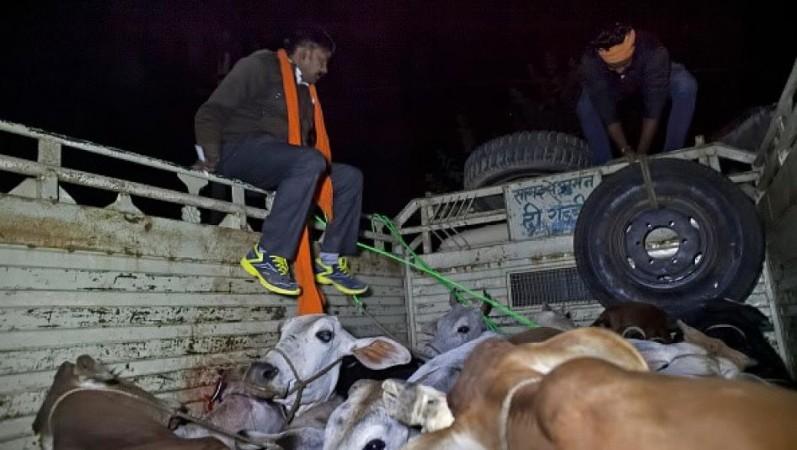
A group of 24 men were tied with a rope, thrashed and forced to chant "gau mata ki jai" in Madhya Pradesh's Khandwa district on Sunday, July 7, for allegedly transporting cows to Maharashtra.
A video of the incident, shared by news agency ANI on Twitter, shows 15 of the cattle transporters tied together with several villagers carrying sticks and forcing the men to do sit-ups, and chant "gau mata ki jai".
#WATCH Several people tied with a rope and made to chant "Gau mata ki jai" in Khandwa, Madhya Pradesh on accusation of carrying cattle in their vehicles. (7.7.19) (Note - Abusive language) pic.twitter.com/5pbRZ4hNsR
— ANI (@ANI) July 7, 2019
Alleging that the men were transporting around 20 cattle for slaughter, the cow vigilantes paraded them through a 2 km stretch to Khandwa police station. The transporters are from Khandwa, Sehore, Dewas and Harda districts in Madhya Pradesh, and include six Muslims.
According to district police superintendent Shiv Dayal Singh, though the men claimed to own the cattle, they couldn't provide any proof of it.
"With none of the 24 men possessing valid documents to prove their claims and also transporting the cattle in vehicles in consonance with relevant guidelines, they were arrested and booked under provisions of the Madhya Pradesh Govansh Vadh Pratishedh Adhiniyam and provisions of Prevention of Cruelty to Animals Act," Singh reportedly said.
Singh added that a case has also been booked for ill-treating the cattle transporters.
The incident comes days after the state approved an amendment to the anti-cow slaughter law in the state. The bill will be introduced in the monsoon session of the state assembly. If passed, the bill will allow a fine of Rs 25,000 to Rs 50,000 and jail term between a year and five years for those who engage in violence in the name of cow protection.
The existing law in the state, that completely prohibits the killing of cattle and keeping and transporting cow meat, does not mention violence or lynching in the name of cow. Cases related to cow vigilantism are currently dealt with under the Indian Penal Code and the Code of Criminal Procedure.














